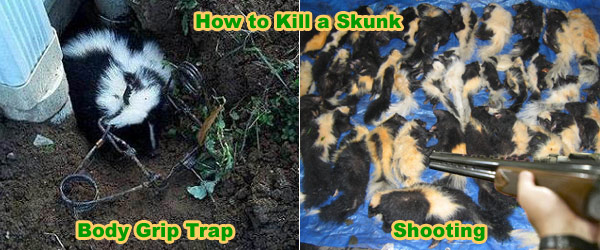- info@wildlife-removal.com
Call us for help in your town
Wildlife Removal Education
Skunk Extermination and Eradication
Need skunk removal in your hometown? We service over 500 USA locations! Click here to hire us in your town and check prices - updated for year 2020.
If you are having a problem with a skunk and want to exterminate it, you do have that option. However, in many cases, be aware that it might be safer to actually live trap and
relocate the skunk. If you are worried about the animal spraying you, read my How to Kill a Skunk Without it Spraying article.
And don't forget: if you have trouble and want to hire a pro like me, someone with experience,
click on this map of Professional Wildlife Removal Companies, and you'll find an expert in your town or city.

So by now, you’ve probably realized that the black and white creature rummaging through your garbage bag isn’t a cat. It’s still cute, but it usually smells much worse than Boots, the feline. Not only is it annoying to re-bag garbage, if you’ve been the target of a skunk spray dousing, you are probably ready to move into a new neighborhood.
Knowing about skunks will help you figure out why you’re having a problem with them. Skunks are found in most areas of the country, so moving is not a reasonable skunk-avoidance tactic. Sensitive to light, these little critters prefer to be active at night and to remain in their burrows during the day. Skunks will eat both plant and animal matter, which is why human garbage is the favorite target for a later night snack. Pet food left outside is also a strong lure for a wandering skunk. Skunks have been known to enter homes through pet doors with the sole intention of eating the cat or dog food. If a source of nutrition is plentiful, a skunk will sent up residence.
Pets and skunks are often a disastrous mix. Dogs are most susceptible to negative encounters with this striped animal from the weasel family. Skunks can carry rabies, a virus which is always fatal to humans and mammals, but more common, and also with lethal implications, skunks can carry canine distemper. Canine distemper is a leading cause of death in young dogs.
Extermination of skunks is tricky due to the potential for a skunk to spray if it feels threatened. Extermination, by definition, is usually the complete elimination of something, either by killing or complete quelling of the activity. If you want to exterminate skunks, there are some humane ways to go about it, but you need to consider some important facts.
A skunk will still smell even when dead, and the gland which creates the foul odor can release if the body is moved postmortem. Skunk odor can ruin objects it comes in contact with. Porous items, like cloth, will need to be thrown away. The vapors from skunk spray can create a burning sensation in the eyes and sometimes can cause nausea and vomiting. If a skunk dies under a shed or within a foundation, the smell will persist for months if not years.
If you still wish to kill the skunk, call a professional wildlife removal company. These professionals have the gear to handle a blast from the skunk if one occurs. If you decide to exterminate the skunk on your own, do so with a rifle that can be used at a respectable distance, and make the shot far away from your home or business. The skunk will likely spray at the time of death, but if you are not in immediate range, your risk level is minimal. The dead skunk can be retrieved from the trap a few days later when the odor is less potent.
Even though you feel determined to exterminate skunks that have become nuisances, consider using a live-trap for pest removal. Live-traps, most often made with wire, can be covered with a tarp or canvas material. When the skunk enters, the tarp can be wrapped around the trap, preventing visual contact with the skunk. Many animals, both domestic and wild, find an instinctual calm in a small, dark space. A trapped skunk can be released without concern of spraying if the method is done properly.
No matter how well-researched and prepared you are, skunk extermination is no easy task. Consider the advice of a professional on this delicate matter
For more information on skunk biology and behavior, and for a recipe to remove skunk spray odor, go to my skunk removal information page.


















